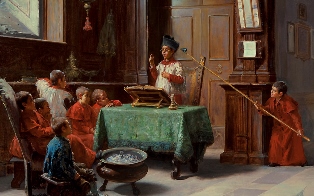 Was there a good point made in the sermon you heard during your Mass of Sunday Obligation? Let us know.
Was there a good point made in the sermon you heard during your Mass of Sunday Obligation? Let us know.
For my part, in my conviction that we need more liturgical catechesis as well as eschatological catechesis (the two are tied together) I spoke about the words “mysterium fidei” during the consecration of the Precious Blood.
After initial comments about the preparation for death as the over-arching “end” of Mass, that gives purpose and shape to the classic “four ends”, I shed some light on the two-fold consecration.
Among other things, I pointed out the shocking innovation of pulling the “mysterium fidei” out of the consecration formula and transforming it into a kind of acclamation. That change was a direct contravention of the mandates of the Council Fathers that a) no change should be made except for the true good of the people and b) that it should be in keeping, organically, with what we have always done (cf. Sacrosanctum Concilium). “Mysterium fidei” was part of the consecration form since at least the 8th c. Moreover, there are options for responding to the “mysterium fidei” in the Novus Ordo, which makes it hard to determine what the “rite itself” thinks “mysterium fidei” means.
I stressed that the claims of some that removing the “mysterium fidei” from the consecration invalidated the consecration form were simply wrong. It is a shocking innovation, but it doesn’t invalidate. I mentioned that in ancient times, a curtain was drawn across the sanctuary, obscuring view and that the deacons would announce “mysterium fidei” probably stemming from 1 Tim 3, stressing that they have to believe in the Eucharist steadfastly. Deacons had a close tie to ministry concerning the Precious Blood. In a solemn Mass, the deacon still prepares the chalice and then says the offertory prayer together with the priest or bishop while holding the base. In any event, the “mysterium fidei” indicates that the change of substance has taken place and that the Body and Blood have been separated in the two-fold consecration, thus sacramentally, symbolically, renewing the death of the Lord on the Cross. You can’t say everything in one moment, but you can say somethings.
Also, I made a point that lay people share in the mission of the Church to teach all nations. I personally can’t reach all the people that you know, but YOU can reach all the people that you know. When you love something, you want to share it. When you have charity for someone, you want what is best for them. Hence, deeper catechesis about liturgy and eschatology, especially for those who desire the traditional forms. We have to be ready at all times to give reasons and explanations, with charity.


































I don’t think I properly understood what the “mystery of faith” referred to until either the new English translation of the Roman Missal came out, or I attended my first TLM — can’t remember which, as they roughly coincided. But the bottom line is that I wasn’t straightened out on this until my late 30s/early 40s, and I went to 12 years of Catholic school.
(EF)
Jesus interrupted the victory march of death.
I don’t remember the sermon at all (was awake all night working a graveyard shift and then went to mass in the day) but I do remember Father mentioning before communion that the traditional and most reverent way to receive is on the tongue, but if we choose to receive in the hand to be sure and consume the host in view of the minister so there is no danger of profanation of Our Lord in the Eucharist. He has been working tirelessly to increase reverence shown to the blessed sacrament and recently mandated intinction by the priest/deacon alone for the handicapped parishioners for those who want to receive the precious blood (some have limited mobility and can’t hold the chalice without dropping it).
Our priest, commenting on the parable of the unjust steward, told us that this is one of his favorite Gospel passages. He related it to his stewardship of the Sacrament of Penance and how it reminds him to be a good steward of this Sacrament. And as a good steward he called us all to be frequent recipients of God’s mercy and love through the Sacrament of Penance.
If you will forgive me for mentioning a sermon outside of Mass: This past weekend was my parish’s annual Forty Hours Devotions, at the Solemn Closing on Sunday afternoon, our guest preacher preached on Pope Benedict XVI and the importance of restoring the sacred, especially the sacred liturgy in continuity with Tradition, for the good of the Church and the world. He quoted from the famous interview: The crisis in the Church is primarily that of the Sacred Liturgy; and from Summorum Pontificum: What earlier generations held as sacred remains sacred for us, too. &c.
[I long for the restoration of 40 Hours Devotion.]
Can someone here please point me to a resource to help me understand yesterday’s Novus Ordo Gospel, which was regarding the rich man and the dishonest steward? I just don’t understand, and our priest preached on the Old Testament reading without discussing the Gospel. Thank you in advance.
Each week I have 400 hundred words in the Catholic Herald (subscribe). I wrote for the CH about this parable HERE. There’s a lot more to be said, of course, because parables are deep deep deep. But the three points I made are a start.
I preached on this parable on the 8th Sunday after Pentecost. It so happened that I was the deacon for this Solemn Mass, so I wound up preaching in my diaconal role in a dalmatic! That’s doesn’t happen too often. The last time was several years ago during a Pontifical Mass when the late, great Extraordinary Ordinary Bp. Morlino felt his voice going and asked me to fill in.
I watched you on YouTube. Grateful for your words Father.
Ordinary Form – Father tackled that troubling line about making friends with dishonest wealth. He interpreted honest wealth is that which endures – things of heaven. Dishonest wealth in analogy to the dishonest steward includes things of this world which we might squander if we treat them carelessly.
We should use our worldly wealth to do things that have eternal value. We should also try to put the same amount of effort into preparing for eternal life as we do for earthly life. I’m not sure how he intended the “same effort” in practical terms (I’m a very long ways short of 40 hours a week of prayer and good works), but it occurred to me this fits in with the advice to do all things out of love of God: I should view my regular work not only as a wordly good, but as a spiritual good I can offer up as a sacrifice and to use to enable me to perform corporal works of mercy.
I just read Father Z’s Catholic Herald column on the parable about the dishonest steward, which reminded me of another point made by our pastor:
His interpretation is that in the parable, the steward had made dishonest wealth for himself by overcharging the debtors, for his own extra profit, similar to those in the first reading who were cheating their customers by tricks like tampering with their scales. His praiseworthy behavior then was to recognize he stood to lose more than just those illicit profits, and to give up those short term profits rather than lose everything long term.
I think this fits in with his discussion of worldly wealth as dishonest – thinking of what we receive as ours to claim as our own, rather than honestly recognizing it as our Master’s which we are entrusted stewardship over.
Father encouraged everyone to fast at least one day a week, and also promoted the start of RCIA and other education and apologetics stuff. He told people to make sure to bring their non-Catholic friends. :)